
When it comes to skincare treatments that target issues your daily routine can’t address, you often hear, “There’s a laser for that.” While it’s true that lasers are effective for hair removal, hyperpigmentation, and reversing signs of aging, it’s also true that lasers historically aren’t designed for darker skin.
[SEE ALSO: Is Your Vitamin C Oxidized?]
“The main problem with darker skin and laser use is the melanin which gives us our color,” explains dermatology nurse practitioner Sherry Sanvictores, MSN, NP. “Lasers use different light wavelengths that affect different components of our skin: hemoglobin (red blood cells), melanin, and water. Shorter wave-length lasers are optimized to target reds and browns—the red blood cells and melanin. These lasers are great for broken capillaries, rosacea and sun spots, but I can’t treat skin types darker than a 3. There is too much melanin absorption. Actress Nicole Kidman is a skin type 1. Skin type 3 is someone who’s white but more Mediterranean: They sunburn and then tan. So you can see these lasers aren’t appropriate for anyone who has a bit of color.”
The risks of inappropriate laser use are burns, scarring, and hyperpigmentation, which ironically are two issues lasers often treat.
That said, there are newer lasers that are safe for darker skin. The caveat is finding a practitioner who is knowledgeable about laser science so you don’t experience any adverse reactions.
“I’ve definitely seen patients who’ve gone to a medspa and the laser made their pigmentation worse,” warns Sanvictores. “Anyone whose skin is darker than a type 3, you have to be careful in choosing your practitioner.”
Sanvictores’s other tip: Don’t be aggressive. Just like with retinol use, she advises going “low and slow.” Sanvictores also uses lower settings on the laser and pre-treats her darker-skinned patients for 4-6 weeks before any laser treatment with hydroquinone and Retin-A to “quiet the melanin.”
The same goes if you have a tan. “If you have an active tan, you have to wait until your tan fades out,” says Sanvictores. “When you’re tan, it means you have more pigment cells that can react to the laser wavelengths with burns and hyperpigmentation.”
The following are lasers that can be used for darker skin tones, but again, choosing an experienced and knowledgeable practitioner is key.
Nd:YAG Laser
@skinfiltrator Laser facial results on black skin? I tried the ND yag laser facial to tackle some of my post acne scars and acne breakouts. These were my results after two sessions 👀 #laserfacial #laserskinresurfacing #facial
♬ Sprinter – Dave & Central Cee
The Nd:YAG laser is a safe and effective option for darker skin tones because it operates at a longer wavelength, which goes deep in the skin without being absorbed by excess melanin. Nd:YAG lasers are great for hair removal, vascular lesions, and pigmentation.
Diode Laser
Diode lasers precisely target hair follicles, making them ideas for hair removal on dark skin. These lasers bypass melanin in the skin’s surface and focus on the melanin in hair follicles. This reduces the risk of hyperpigmentation and makes diode lasers a safe and effective option for hair removal.
Fractional Laser
@kyli.no.e Clear & Brilliant Facial at Laser Away📍 #clearandbrilliant #fraxel #fraxellaser #laseraway #skincare #facial #facialtreatment
♬ What Happened To Virgil (feat. Gunna) – Lil Durk
For acne scars, fine lines, and uneven skin texture, there’s fractional lasers. Fractional lasers “use a longer wavelength for superficial collagen stimulation and remodeling,” says Sanvictores. Fractional lasers, like Clear + Brilliant or Fraxel, can be adjusted for darker skin tones.
Picosecond Laser
Picosecond lasers deliver ultra-short pulses of energy for treating pigmentation without excessively heating the surrounding tissue. They’re used for tattoo removal, melasma, and other pigmentation issues on darker skin.
Have you ever had laser? If so, what was your experience? Let us know in the comment section!



